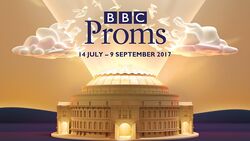
2017 Proms logo.
The Proms (or, to give them their full title, the Henry Wood Promenade Concerts) is a series of live performances that started at the Queens Hall in London in 1895 and after that building was destroyed by bombing in 1941 moved to their present home of the Royal Albert Hall, Kensington Gore. Their name comes from the practice initiated by Sir Henry Wood, their first chief conductor, of allowing areas in front of the stage and in the galleries for the audience to walk around and (in the earliest days) eat and smoke. The Proms run from July to September each year and attract a wealth of international talent. Since 1927 the series has been run by the BBC, who now broadcast each Prom in full on BBC Radio 3 and televise many. The Last Night has passed into the folklore of British culture, being treated as more of a party than a formal concert, with considerable audience participation (Peel refers to "uproar and lack of restraint" during this event).
In the early 1960s, pop music promoters borrowed the "Prom" title, staging an annual Albert Hall "Pop Prom", apparently "an annual fundraising event for the Printers' Pension Corporation, promoted by the teen magazines Valentine, Marilyn and Roxy"; the 1963 "Great Pop Prom" was headlined by the Beatles [1] and the Rolling Stones. In 1969 the promoter Roy Guest organised a series of Pop Proms at the Albert Hall, featuring a range of artists from the Dubliners to Chuck Berry, the Who and Led Zeppelin; Peel hosted a concert on 2 July, with a bill of his favourites of that time; the Incredible String Band, Family and Fairport Convention
Violence from rockers and Teddy Boys at the 1969 Who/Chuck Berry Pop Prom led to the RAH refusing to repeat the Pop Proms, which in the following year moved to the Roundhouse. But in 1970, the "official" Proms concerts began to host popular music, in order to extend Wood's remit of reaching out to the masses who would not normally attend a concert hall, and the first of these was Soft Machine on 13 August. The Softs' audience came to listen rather than cause trouble, but the RAH became increasingly wary of pop artists after a series of incidents. JP claimed that there was a black list of musicians who were banned from performing at the Albert Hall, including the Nice, Deep Purple, Frank Zappa, James Brown and others[1] (but not Cream, whom he had introduced at the Hall in 1968).
Links to Peel[]

Radu Lupu: "fine visually as well as musically, boasting a great mass of hair and a beard, and at times he bore a strong resemblance to the majestic Captain Beefheart."
On the Top Gear of 11 July 1970, Peel mentions that the session artists on the following week's programme would include "Soft Machine, stars of the Proms", but there is no record of him having attended the concert at which they appeared..
However, he is known to have attended at least two Proms (in his article on the second below, he claimed it was his first in twenty years, suggesting he may have attended in 1975 - or more likely misremembered the date of the first).The first (1971-07-24) featured Charles Groves and the Liverpool Philharmonic Orchestra with Radu Lupu performing Grieg's Piano Concerto in A minor ("This is probably regarded as a much over-performed work by the cognoscenti but we were delighted to hear it again"), preceded by Sibelius' 6th Symphony ("a soothing work full of rhythm and clear, open vision") and succeeded by a new piece by Bernard Naylor (which Peel claimed was reminiscent at time of Pink Floyd's Atom Heart Mother) and Elgar's familiar Enigma Variations. [2] [2] The second was performed by the BBC Philharmonic Orchestra under Yan Pascal Tortelier and Sir Peter Maxwell Davies, who conducted his own piece, 'The Beltane Fire' (which John appears not to have enjoyed). Grigory Sokolov was the soloist in Rachmaninov's Piano Concerto no. 3 in C minor. [3] [3] In both, JP noted the showmanship of the pianists and was somewhat appalled by the behaviour of the Promenaders in the first and amazed by the stoicism of the people in his box in the second.
Although it was not part of his normal remit, a promotional Peel item for the Proms can be heard on 04 May 1996 (BFBS) (accompanied by a self-deprecating "Pretentious git!").
Links[]
- Footnotes
- ↑ The Nice were banned from the Albert Hall in June 1968, after they had set fire to an American flag while performing their version of Leonard Bernstein's "America". A performance by the Royal Philharmonic Orchestra of Zappa's "200 Motels", due to be staged on 8 February 1971, was cancelled by the RAH, who deemed it "obscene". When James Brown appeared at the RAH, on 10 March 1971, damage by fans to the Hall led to him being banned. Later that year, "excessive and 'wanton' damage" done by Deep Purple fans caused the RAH management to write a letter of complaint to NEMS Enterprises, who had organised the concert.
- ↑ Olivetti Chronicles: 'Peel At The "Quiet" Albert Hall,' pp. 293-7 (Corgi), reprint of an article from Disc, 1971-07-31.
- ↑ Olivetti Chronicles: 'Sock Syndrome,' pp. 377-380 (Corgi), reprint of a Radio Times article, 12-18 August 1995.